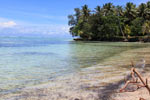Four commodities produced in just eight countries are responsible for a third of the world’s forest loss, according to a new report. Those familiar with the long-standing effort to stop deforestation won’t be surprised by the commodities named: beef, palm oil, soy, and wood products (including timber and paper). Nor will they be very surprised by most of the countries: Brazil, Indonesia, Malaysia, the Democratic Republic of the Congo, Papua New Guinea, Bolivia, Argentina, and Paraguay.
“The trend is clear, the drivers of deforestation have been globalized and commercialized”, said co-author Martin Persson with Chalmers University of Technology.
The report, commissioned by the Center for Global Development (CGD), found that these four commodities from the eight select countries were responsible for the loss of 3.9 million hectares of forest, an area about the size of Switzerland, in just one year: 2009. Moreover, the loss of these forests emitted 1.7 gigatons of CO2 during 2009 as well.

Deforestation in Sumatra, one of the global deforestation hotspots. Photo by: Rhett A. Butler.
“From having been caused mainly by smallholders and production for local markets, an increasing share of deforestation today is driven by large-scale agricultural production for international markets,” said Persson.
This means that much of the deforestation in question is actually driven by consumer demand from abroad.
“If we exclude Brazilian beef production, which is mainly destined for domestic markets, more than half of deforestation in our case countries is driven by international demand,” confirmed Persson.
The biggest importer of these deforesting commodities was China, linked largely to wood products (timber and paper) from Malaysia, Papua New Guinea, and Indonesia, as well as palm oil imports from the latter. The EU was the second biggest importer of the four commodities, due to imports of palm oil from Indonesia, beef from Brazil, and soy from Latin America. India came in third, largely due to palm oil imports from Indonesia.
The U.S. was not a major importer, mostly because it produces the bulk of its own beef and soy.
Yet the consolidation of deforestation into a few big industries stemming from a small cadre of countries has led to a recent slew of so-called “zero deforestation” commitments. Here, big, international corporations pledge to rid their commodities from deforestation, including such giants as Cargill, Kellogg, Nestle, and Disney. While the efficacy of such initiatives remains uncertain—none are older than a few years—it remains a possible bright spot in the fight against deforestation.
“Pushed by environmental organizations and seeing the risks of being associated with environmental destruction, companies like Unilever and McDonalds are pressuring their suppliers to stop expanding production on forest land,” said Persson. “Today both public and private consumers, be it individuals or corporations, have the possibility to contribute to the protection of tropical forests by holding suppliers accountable for the environmental impacts of their production.”

The EU and China are the largest importers of carbon dioxide emissions linked to deforestation for the production of beef, soy, palm oil and timber between 2000-2009. The researchers have focused on seven countries (Argentina, Bolivia, Brazil, Paraguay, Indonesia, Malaysia and Papua New Guinea), all of which are major exporters of goods that contribute to deforestation. Click to enlarge.
Related articles
Brazil declares new protected area larger than Delaware

(10/23/2014) Earlier this week, the Brazilian government announced the declaration of a new federal reserve deep in the Amazon rainforest. The protections conferred by the move will illegalize deforestation, reduce carbon emissions, and help safeguard the future of the area’s renowned wildlife.
Next big idea in forest conservation? Recognize the value of novel forests

(10/23/2014) Think first before you eradicate non-native species says Dr. Ariel E. Lugo, the current director of the International Institute of Tropical Forestry within the USDA Forest Service, based in Puerto Rico. Lugo, an accomplished ecologist, supports the idea that both native and non-native plants have important roles to play in conservation efforts.
Gold mining expanding rapidly along Guiana Shield, threatening forests, water, wildlife

(10/22/2014) Gold mining is on the rise in the Guiana Shield, a geographic region of South America that holds one of the world’s largest undisturbed tract of rainforest. A new mapping technology using a radar and optical imaging combination has detected a significant increase in mining since 2000, threatening the region’s forests and water quality.
Colombia reports drop in deforestation

(10/21/2014) Colombia has for the first time released an annual report on deforestation, revealing that forest loss during 2013 was lower than the recent average. The government says some 120,933 hectares of natural forest were cleared between January and December 2013.
‘No forests, no cash’: palm oil giants commit to sustainability, but will they follow through?

(10/21/2014) Four of Indonesia’s largest palm oil producers signed a landmark commitment in New York in September to further implement sustainable practices across one of the country’s largest commercial sectors. Then-President Susilo Bambang Yudhoyono and the Indonesia Chamber of Commerce (KADIN) witnessed the undertaking, which is hoped to expand the country’s palm oil industry while making it more environmentally friendly.
Coal, climate and orangutans – Indonesia’s quandary

(10/21/2014) What do the climate and orangutans have in common? They are both threatened by coal – the first by burning it, and the second by mining it. At the recent United Nations Climate Summit in New York, world leaders and multinational corporations pledged a variety of actions to reduce greenhouse gas emissions and deforestation to avert a looming disaster caused by global warming.
Top scientists raise concerns over commercial logging on Woodlark Island

(10/21/2014) A number of the world’s top conservation scientists have raised concerns about plans for commercial logging on Woodlark Island, a hugely biodiverse rainforest island off the coast of Papua New Guinea. The scientists, with the Alliance of Leading Environmental Scientists and Thinkers (ALERT), warn that commercial logging on the island could imperil the island’s stunning local species and its indigenous people.